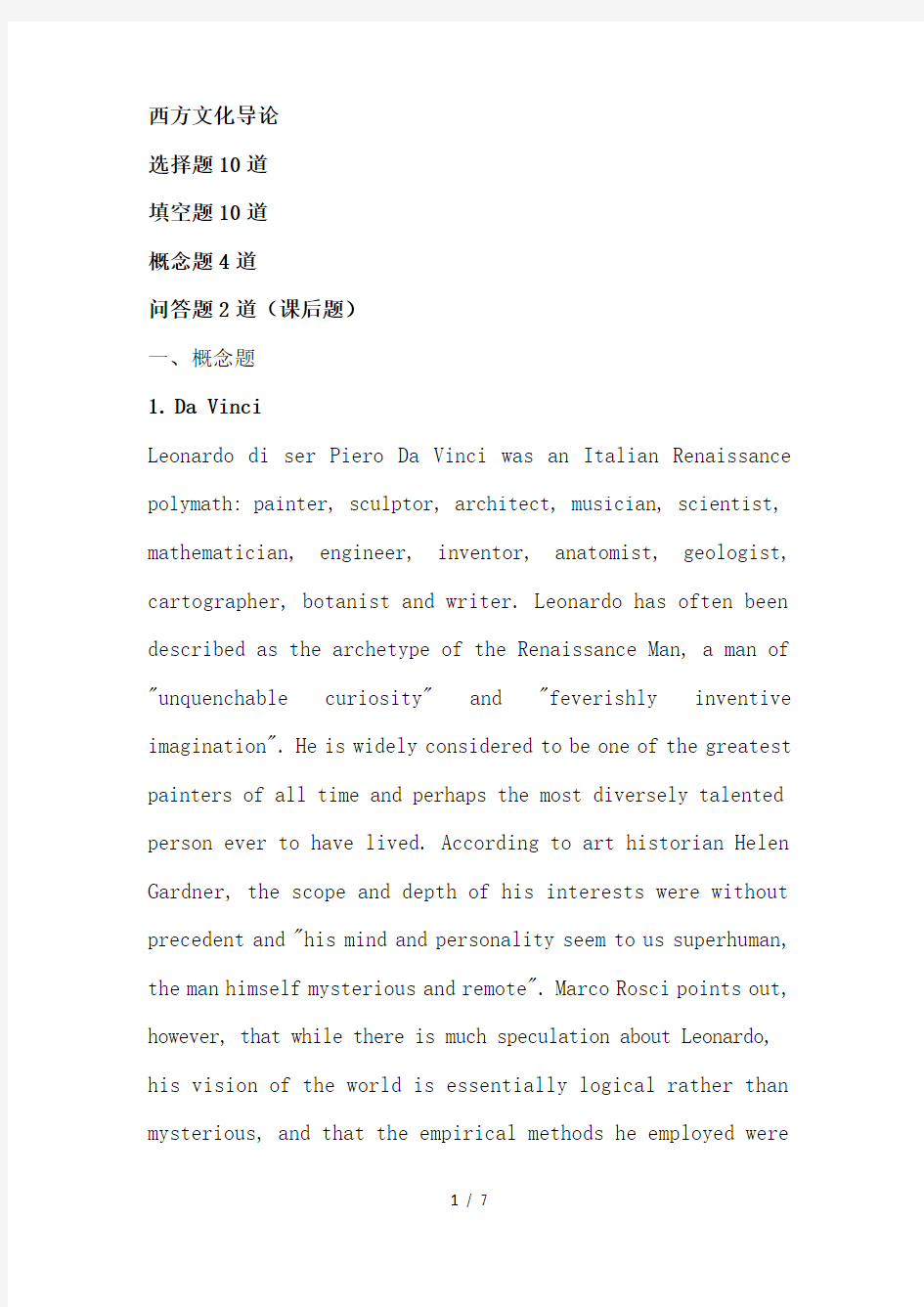
西方文化导论-考试复习
- 格式:docx
- 大小:14.50 KB
- 文档页数:7


西方文化导论
选择题10道
填空题10道
概念题4道
问答题2道(课后题)
一、概念题
1.Da Vinci
Leonardo di ser Piero Da Vinci was an Italian Renaissance polymath: painter, sculptor, architect, musician, scientist, mathematician, engineer, inventor, anatomist, geologist, cartographer, botanist and writer. Leonardo has often been described as the archetype of the Renaissance Man, a man of "unquenchable curiosity" and "feverishly inventive imagination". He is widely considered to be one of the greatest painters of all time and perhaps the most diversely talented person ever to have lived. According to art historian Helen Gardner, the scope and depth of his interests were without precedent and "his mind and personality seem to us superhuman, the man himself mysterious and remote". Marco Rosci points out, however, that while there is much speculation about Leonardo, his vision of the world is essentially logical rather than mysterious, and that the empirical methods he employed were
unusual for his time.
2. Shakespeare
William Shakespeare was an English poet and playwright, widely regarded as the greatest writer in the English language and the world's pre-eminent dramatist. He is often called England's national poet and the "Bard of Avon". His surviving works, including some collaborations, consist of about 38 plays, 154 sonnets, two long narrative poems, and several other poems. His plays have been translated into every major living language and are performed more often than those of any other playwright.
3.black humor
The definition of black humor is problematic; it has been argued that it corresponds to the earlier concept of gallows humor; and that, as humor has been defined since Freud as a comedic act that anesthetizes an emotion, all humor is "black humor," and that there is no such thing as "non-black humor".
二、填空题
1. Pindar is best known for his odes celebrating the victories at the athletic games, such as the 14 Olympic odes.
2. The three great tragic dramatists of ancient Greece are Aeschylus, Sophocles, and Euripides.
3. Aeschylus wrote such plays as Prometheus Bound, Persians and
Agamemnon.
4. Euripides(欧里庇得斯) wrote mainly about women in such plays as Andromache, Medea, and Trojan Women.
5. Comedy also flourished in the 5th century B. C.. Its best writer was Aristophanes, who has left eleven plays, including Frogs, Clouds, Wasps and Birds.
6. Euripides _ is the first writer of "problem plays".
7.Herodotus(希罗多德)is often called “Father of History”. He wrote about the wars between Greeks and Persians.
8. Thucydides(修西得底斯) described the war between Athens and Sparta and between Athens and Syracuse, a Greek state on the Island of Sicily.
9.Pythagoras(毕达哥拉斯) was a bold thinker who had the idea that all things were numbers.
10. Pythagoras was the founder of scientific mathematics.
11. She-wolf is the statue which illustrates the legend of creation of Roman.
12. The dividing range in the Roman history refers to 27 B.C.
13. “I came, I saw, I conquered.” is said by Julius Caesar.
14. Jesus went with his disciples to Jerusalem for the Passover, but was betrayed by Judas.
15. In 313 the Edict of Milan(米兰敕令)was issued by